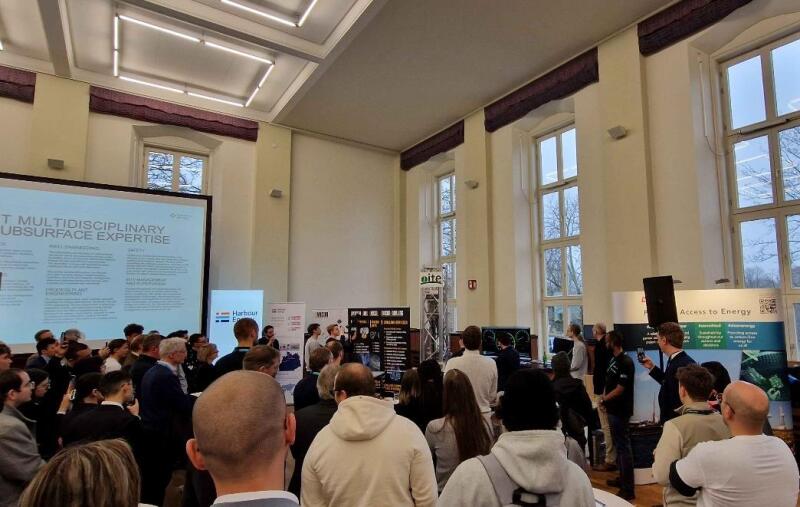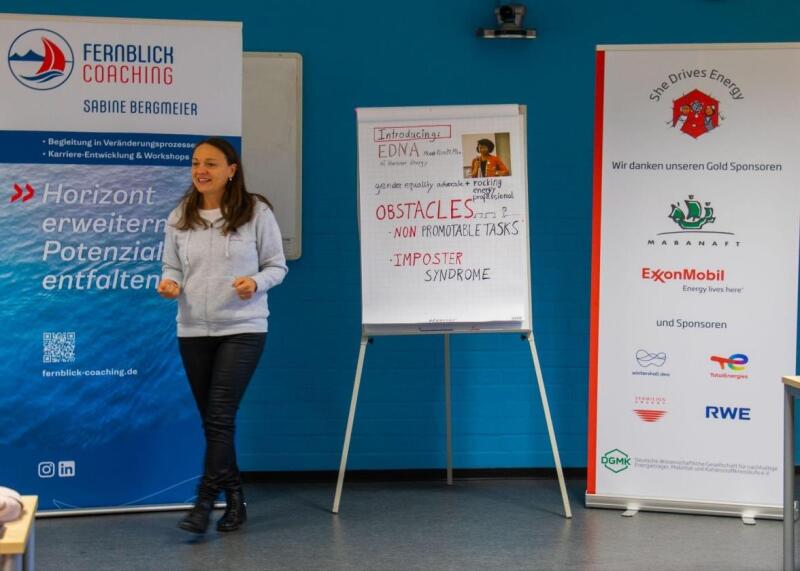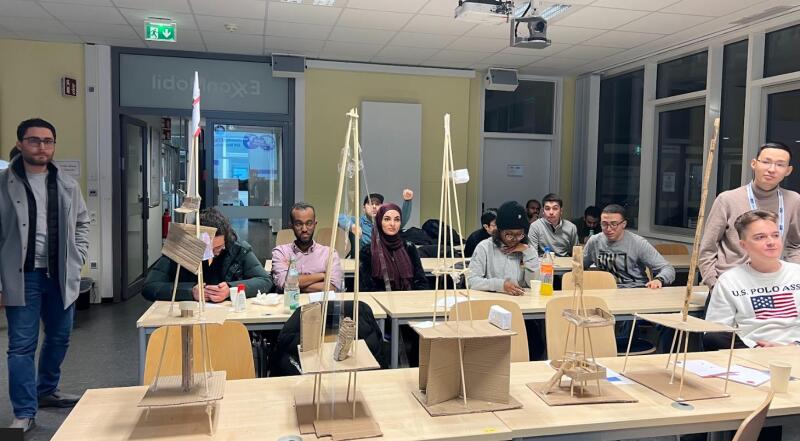In December 2024, more than 120 students, professionals, and academics gathered in Clausthal-Zellerfeld, Germany, for the 19th edition of the Student Technical Congress (STC). The event is organized by the SPE German Section (GSSPE) and their associated student chapters including the SPE University of Clausthal (TU) Student Chapter.
Over the course of 3 days, the congress proved that with rigor and collaboration, students can deliver a high-caliber conference. From keynote speeches by global industry leaders to hands-on technology showcases, expert panels and networking with major energy players, STC 2024 went far beyond traditional student events inspiring both attendees and exhibitors alike.
Driving the Energy Conversation
The congress opened with remarks from Philip Jaeger, TU Clausthal head of the petroleum production systems department, Sylvia Schattauer, TU Clausthal president, GSSPE Edna Michelle Bisso Bi Mba chairperson,and STC Chairperson Mohamed Eita, who praised the dedication of the student-led organizing team to create not just a student gathering but a technical congress that would showcase real-world innovations, provoke critical thought on the energy transition and connect students to industry.
SPE 2025 President Olivier Houzé delivered the opening keynote. He outlined SPE’s evolving role amid the energy transition, built on three pillars—core (E&P), low carbon (decarbonization), and new energy (subsurface). He highlighted initiatives like the GEODE Consortium, led by Project InnerSpace and SPE, which unites more than 100 organizations in cross-sector collaboration. He also urged experienced professionals to support the next generation through mentorship and emphasized the need to retain young talents by providing them with purpose, perspective, and direction.
The second day featured Bergrat Olaf Franz from the State Mining Authority of Lower Saxony, Germany, who emphasized Germany’s urgent need for innovative energy solutions. He highlighted emerging opportunities in deep geothermal, hydrogen storage, and nuclear waste disposal, calling for more young professionals to enter the mining and energy regulatory sectors.
Lars Nydahl Jørgensen, European director of the International Association of Drilling Contractors (IADC), challenged the audience’s worldview. While recognizing climate change, he urged students to take a broader view of global challenges like biodiversity loss and to embrace optimism. “Humans are inventive,” he noted, “and technical professionals can solve these problems.” He spotlighted IADC’s efforts to set geothermal drilling standards and inspired the room with a message of resilience, opportunity, and technical relevance in today’s evolving energy world.
The TUC Drillbotics Show: Innovation in Action
One of the most captivating elements of the congress was the TUC Drillbotics Student Competition where the TU Clausthal student team showcased their award-winning 1.5-in. directional drilling rig. Already the 2023–2024 international Drillbotics Group B (physical rig) winners, the team manually steered a directional well and walked attendees through their design—presenting advancements in steerable BHA (bottomhole assembly) design, DWIS (Drilling-Wells Interoperability Standard) integration, and a cutting-edge control system.

The show emphasized the real-world application of academic research, the growing role of automation and digitalization, and the interdisciplinary collaboration needed to drive drilling innovations forward.
Young Professionals Panel: Navigating the Transition
A powerful young professionals (YP) panel discussion, titled "Navigating the Transition: Insights for New Graduates," brought together four professionals across drilling, subsurface engineering, geothermal energy, and reservoir management: Daniel Hirschl (MB Well Services), who emphasized hands-on experience and career progression through operational roles; Aura Alvarado de la Barrera (DEEP.KBB), who pointed out the repurposing of oil caverns for gas and hydrogen storage and highlighted the need for adaptability in energy careers; Valentin Goldberg (BWG), who shared how SPE helped him (originally a geologist) embrace petroleum engineering through geothermal innovation; and Kseniia Zhukova (Harbour Energy), who advised international students on adapting to the German job market by focusing on upskilling and relevant experience. She stressed that what they learn at university matters more than the institution's prestige.
The panel, moderated by Maxim Boreiko (Equinor) and Jasna Merkelbach (Harbour Energy), offered practical takeaways on personal growth, industry trends, and navigating career uncertainty with confidence.

"She Drives Energy" Workshop
Led by Sabine Bergmeier (Fernblick Coaching) and supported by DGMK’s "She Drives Energy Network," two self-empowerment workshops engaged students from diverse backgrounds. The sessions were open to all genders and addressed soft-skill gaps that are often overlooked in engineering education. Thus, through real-life reflection, role-playing and coaching, participants explored how to assert themselves, navigate gender dynamics in technical fields, and recognize their personal strengths.

Job Fair
The STC Job Fair, held alongside the student poster session, featured more than 10 companies, including ExxonMobil, Baker Hughes, Harbour Energy, Hartmann Valves, Deep.KBB, BVEG (Bundesverband Erdgas, Erdöl und Geoenergie), KCA Deutag, Vermilion Energy, Wilczek Engineering, Sirius-ES, MICON Drilling, and AtkinsRéalis. Exhibitors engaged with students on research topics, internships, and career pathways. Interactions with SPE leaders like Olivier Houzé, Edna Michelle Bisso Bi Mba, and Lars Jørgensen further elevated the networking environment, offering students rare access to industry trailblazers. For many, the job fair was the start of professional relationships, future opportunities, and renewed motivation to enter the energy workforce.
Building Connections Across Borders
Other impactful congress features included:
- Team building exercise: Student teams built mock drilling rigs from limited resources fostering creativity, cooperation, and real-world problem-solving under pressure.
- Student chapter exchange: Seven SPE student chapters from across Europe shared best practices and regional insights.
- Poster and presentation awards: Winning presentations included a standout by the Drillbotics team and a best poster on offshore and onshore monitoring strategies for carbon capture and storage
- Social events and networking: From BBQ to dinner and the closing party, attendees bonded beyond the technical sessions.

Closing Reflections
In the words of STC 2024’s organizers and participants, this was not just an event, it was a transformational experience. Students sharpened their technical knowledge, gained direct access to employers, and tested their leadership and organizational abilities on a stage typically reserved for seasoned professionals.
Behind-the-scenes faculty support, especially from Philip Jaeger, played a pivotal role. His commitment to mentoring and backing student-led initiatives reflected the power of academia-industry collaboration. Above all, STC 2024 affirmed that students are not just the future of the energy industry, they are already shaping it.
A Call to Action for Industry and Students
To industry leaders: STC is a proving ground. The students organizing and participating in these congresses are the very talents your companies seek i.e., driven, technically capable, and eager to contribute to the energy transition. Your continued involvement, sponsorship, and mentorship will accelerate the growth of these future professionals.
To students: Don’t wait to lead. Whether presenting research, building rigs, moderating panels, or organizing logistics, your voice and skills matter now. Join your local SPE student chapter, attend conferences, and be part of the innovation movement reshaping our field.
Acknowledgments: Many thanks to the STC 2024 organizing team. Their detailed post-event report made writing this article seamless.


